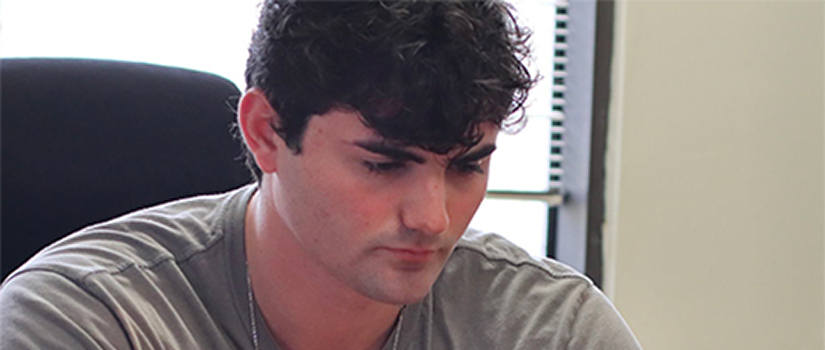If you’re surprised that the College of Arts and Sciences — and not the computer science department — is offering a brand-new cyber intelligence major in the fall 2021 semester, you might be forgetting about the human side of the cyber world. The ever-increasing ransomware attacks, the attempted election hacks in the United States and abroad, the myriad high-profile data breaches — there are always people behind them, says Jodi Salter, the academic services manager at the Walker Institute.
“Everyone thinks this is the cyber world,” Salter says, lifting a computer keyboard from her desk and slapping her hand on the keys. “And it’s not. It’s a heartbeat.”
The Walker Institute developed the cyber intelligence major, Salter says, in response to a need to broaden the skill sets of people in cybersecurity, a field traditionally reliant on computer science or information technology skills. Institutions such as the United States Military Academy, the United States Naval Academy and Embry-Riddle University have similar programs, but the University of South Carolina’s program is the only one offered in a college of arts and sciences and takes an interdisciplinary approach.
“This is the first program that focuses strongly on the human side of cyber,” Salter says. “The other programs are cybersecurity programs with a bit of policy, with a bit of language. This one is policy, language, history, homeland security, geographic information systems, information science and data — with the analytics, too. We are embracing a component of cyber that has yet to be embraced in the educational world.”
Cybersecurity and cyber intelligence are related, says Clay Fuller, a research affiliate at the Walker Institute who built and will teach the cyber intelligence program’s overview course. But their skill sets are different. Cybersecurity emphases technical training in engineering and computer science; cyber intelligence emphasizes operational and policy issues.
“This is stepping outside of cybersecurity,” says Fuller, who earned a doctorate in political science from South Carolina in 2017. “You have to be able to take a broader view and a larger perspective. The military, ROTC, people like that — they need people who can talk to people about what’s going on in cyberspace without talking above their head.”
The cyber intelligence program’s interdisciplinary nature also reflects a need to develop new approaches to securing networks, data and people as cyberthreats arise and evolve. Hacking and ransomware aren’t going anywhere, and the next wave of developments — blockchain technology, cryptocurrencies and satellite internet connectivity — will bring new challenges. The holistic approach taught in the cyber intelligence program will help students solve them.
This is the first program that focuses strongly on the human side of cyber. We are embracing a component of cyber that has yet to be embraced in the educational world.
— Jodi Salter, academic services manager, Walker Institute
Fuller’s overview course, for example, covers far-ranging topics like psychological priming and surveillance capitalism in addition to basic digital hygiene.
“There's nothing out there really prepping anybody for this coming tidal wave of cyber stuff,” Fuller says. “You have to understand the world. Everybody’s watching everybody. Everybody’s collecting data on everybody.”
The cyber intelligence major also comes at a time when the information security industry is working to grow its labor force. The (ISC)2, an international nonprofit organization that trains and certifies cybersecurity professionals, estimates that there are more than 3 million unfilled cybersecurity positions worldwide. Fuller observed the demand up close during his years at public policy think tanks in Washington, D.C. Think tanks, election-monitoring organizations like the International Republican Institute or the National Democratic Institute, the U.S. Department of Defense and private businesses — they’re all looking for people who have the kinds of skills the cyber intelligence program will develop, Fuller says.
“This is all young people are doing [in D.C.],” he says. “There are so many private intelligence firms who are hiring and training their own students. And so, this degree is a wonderful way to open people’s minds to thinking about how to get into that funnel that goes straight into these places.”
The cyber field’s labor shortage and its prominence in headlines have spurred student interest in the cyber intelligence major. Salter says students were working toward the degree before it was approved, and she gets emails from students interested in the program every day.
“It’s new, sexy and exciting,” she says. “It’s exhilarating to see how excited they are about coming into this program.”
South Carolina junior J.C. Long started in the business school but found that he loved coding and language learning more than accounting. He went to an exploratory advisor, who mentioned the cyber intelligence program. And the Colonial Pipeline ransomware attack happened to be dominating the news cycle.
“I looked at that and said, ‘Well that isn’t going to stop,’” Long says. “This is going to be a big thing in the future, and I wanted to be one of the first ones on it.”
This story was part of the College of Arts and Sciences Fall 2021 alumni magazine. To read more stories from this magazine, visit go.sc.edu/CASMagazine.
